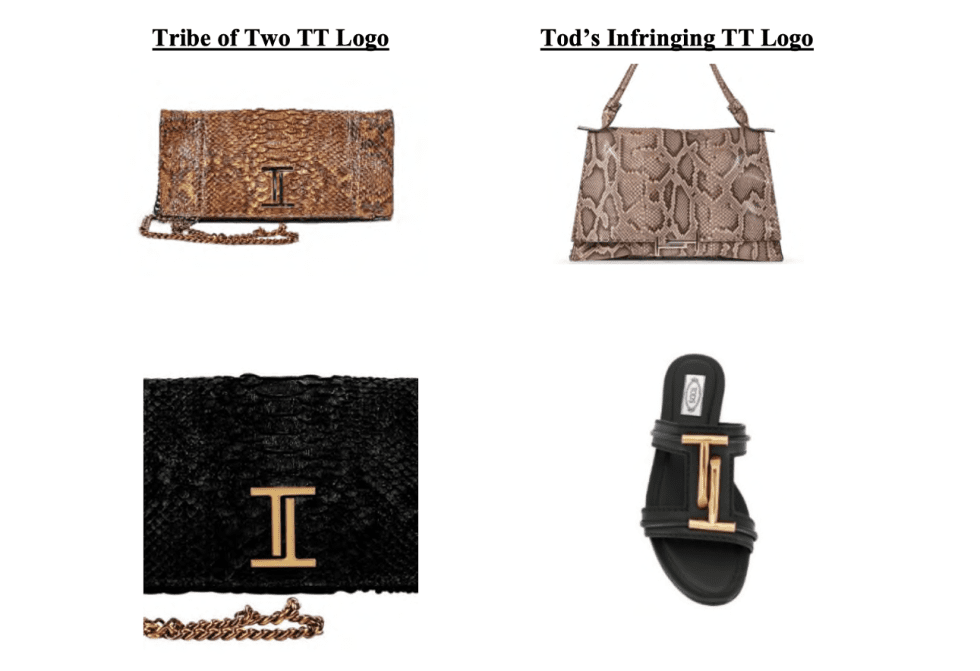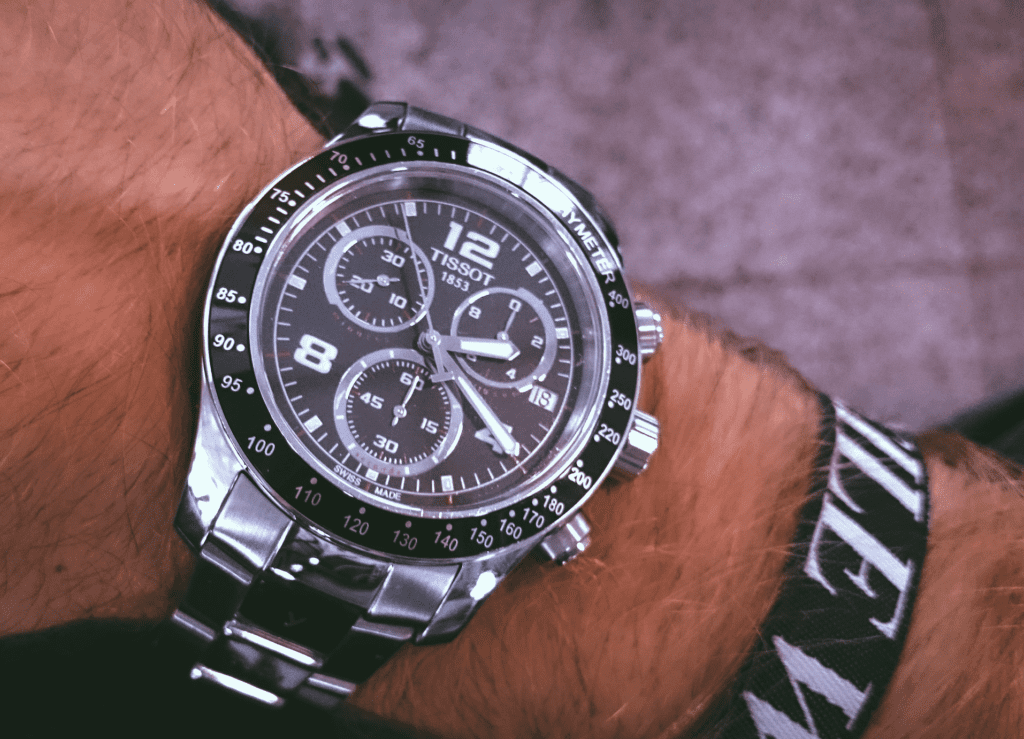Tod’s is pushing back against the trademark infringement lawsuit that is waged against it by a smaller luxury handbag brand. In a newly-filed answer and counterclaims, Tod’s asserts that there is no likelihood of confusion between Plaintiff Tribe of Two’s “TT” trademark and its own “Double T” logo, and even if there is, the law is on its side since it began using a “Double T” logo before Tribe of Two did, and thus, has superior rights in the trademark. Tribe of Two filed suit against Tod’s in a New York federal court this spring, alleging that its co-founder designed a double-T logo in 2012 only to have it be co-opted by Tod’s a few years later for use on handbags and footwear, which it included in the “Iconic Double-T Collection” that it showed in Milan in 2016.
After denying the bulk of the allegations included in Tribe of Two’s May 2023 amended complaint (save for claims like, “fashion houses rely on their names and brand recognition to help drive revenue and that unique, distinctive and memorable logos can be a valuable asset for companies,” which it admits), Tod’s sets out an array of affirmative defenses to Tribe of Two’s trademark infringement, false designation of origin, and unfair competitioncauses of action, as well as trademark infringement and cancellation counterclaims.
Tod’s, Trademark Tacking & Apple
In addition to defenses like acquiescence and laches, Tod’s makes a tacking argument, claiming – in short – that because it has used very similar logos in the past, its trademark rights in the current Double-T logo actually date back further than the debut of the “Iconic Double-T Collection” in 2016. Tod’s asserts that it has used “closely similar variations of the Tod’s Double T design at” issue on shoes, bags, leather goods, and sunglasses since at least 2006, which is “long before any use by Tribe of Two of its TT logo.” Earlier versions of its Double-T mark technically differ from the “updated” one that is being challenged by Tribe of Two in this case, but Tod’s contends that the “updated” logo incorporates “minor stylistic modifications” to the earlier marks that “not alter the character of [its] prior Double-T marks” and that do not make it “materially differ from Tod’s [earlier] Double-T marks.”

Given that all of its Double-T marks “feature opposing capital letter T’s that create the same continuing commercial impression,” Tod’s argues that they are “legal equivalents.” As a result, its use of the earlier Double-T marks before Tribe of Two developed any rights in its TT logo “provides [it] with priority of use through tacking that defeats Tribe of Two’s claims.”
Not the only party to make a tacking claim as of late, you will recall that Apple sought to achieve an earlier priority date in an opposition proceeding waged against it in its bid to register APPLE MUSIC with the U.S. Patent and Trademark Office. Jazz musician Charles Bertini opposed Apple’s application, arguing that APPLE MUSIC was likely to cause confusion with the APPLE JAZZ mark he has been using in June 1985. Since Apple began using the APPLE MUSIC mark in June 2015 when it launched its music streaming service, the Cupertino, California-based company tried to tack the date of the first use of an earlier mark onto its APPLE MUSIC mark. Specifically, Apple pointed to a registration for APPLE for use on “gramophone records featuring music” and “audio compact discs featuring music” (which Apple previously acquired from the Beatles’ record company), which has a priority date in August 1968.
Unpersuaded, the Federal Circuit sided with Bertini, holding that Apple could not tack back to 1968 since the goods/services in the earlier APPLE registration – “gramophone records featuring music” and “audio compact discs featuring music” – and those in the subsequently filed APPLE MUSIC application – including the production and distribution of sound recordings and arranging, organizing, conducting, and presenting live musical performances – are not “substantially identical.” The court held that the goods/services need not be “completely” identical for tacking to be permitted, but “the new goods or services [must be] within the normal evolution of the previous line of goods and services.”
While Apple may be able to tack its “production and distribution of sound recordings” services based on the “gramophone records featuring music” in the earlier registration (given the advances in music technology that have occurred), the court held that such tacking does not extend to broader goods/services like live music performances. “No reasonable person could conclude … that gramophone records and live musical performances are substantially identical,” the court held.
The nuance in that case is the question of whether a trademark owner can establish priority for all of the goods/services in an application by establishing priority via tacking for just one of the goods/services in that application. The court, of course, said no, which means that a trademark owner seeking to establish priority through tacking needs to be able to show that all of the goods/services listed in an application are “substantially identical” to those in the earlier one(s).
Tod’s Counterclaims
Back to Tod’s, which argues that “in the event it is determined in this action that there is a likelihood of confusion between any of Tribe of Two’s marks and [its] Double-T design, then Tribe of Two’s use of the Tribe of Two’s marks constitutes trademark infringement, false designation of origin, and unfair competition.” In a similar vein, Tod’s claims that if it is determined in this action that there is a likelihood of confusion, then Tribe of Two’s 2013 registration for its TT mark should be cancelled because it “would also create a likelihood of confusion with Tod’s [earlier] Double T marks in which Tod’s own prior trademark rights.”
With the foregoing in mind, Tod’s requests that the court dismiss Tribe of Two’s amended complaint in its entirety and award it reasonable attorneys’ fees and costs. Or alternatively, in the event it is determined in this action that there is a likelihood of confusion between any of Tribe of Two’s marks and [its] Double T design, Tod’s is seeking a permanent injunction to bar Tribe of Two from making use of its allegedly infringing logo, damages, and an order from the court cancelling Tribe of Two registration for the TT mark.
The case is Tribe of Two, LLC v. Tods, S.p.A., Ltd., 1:23-cv-03255 (SDNY).











